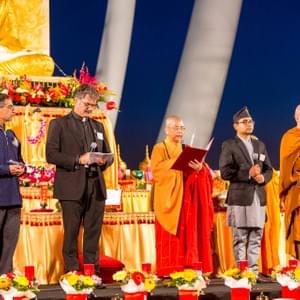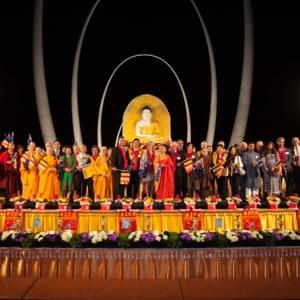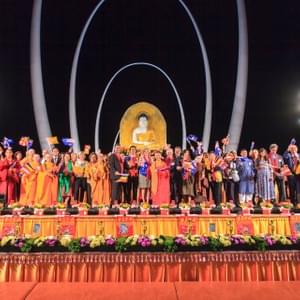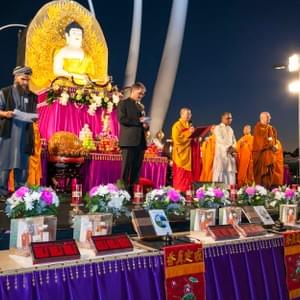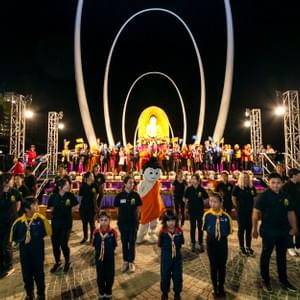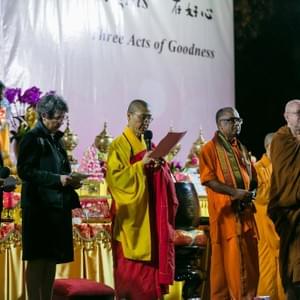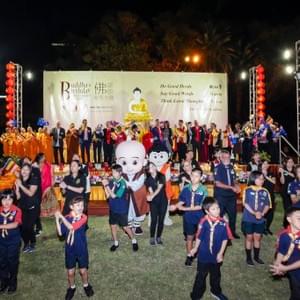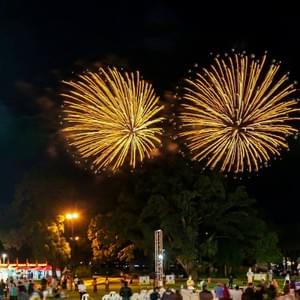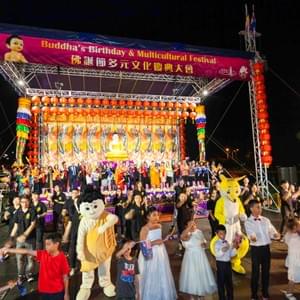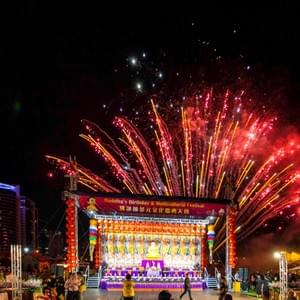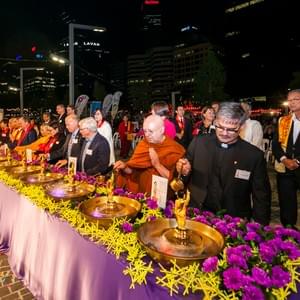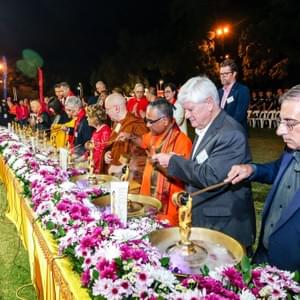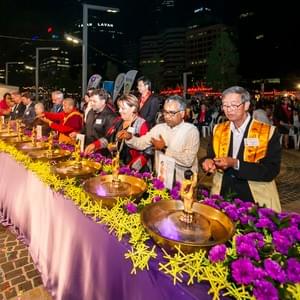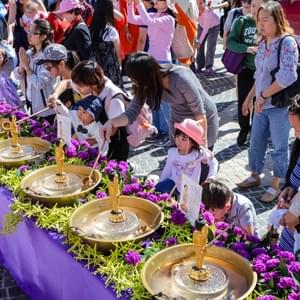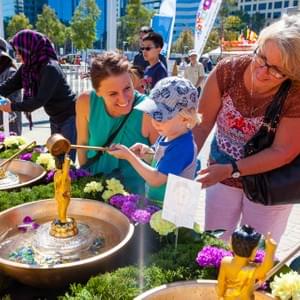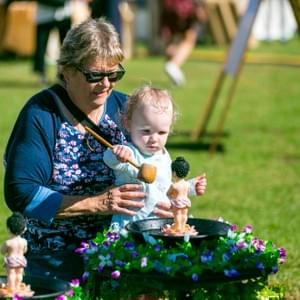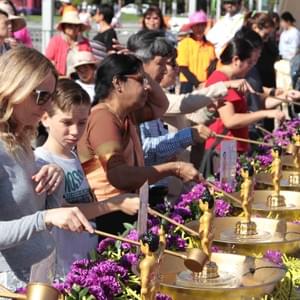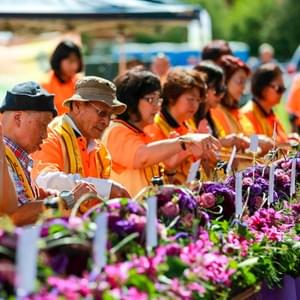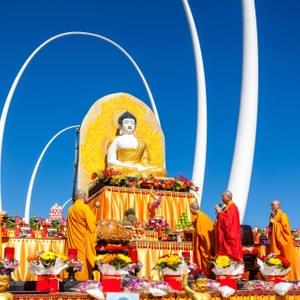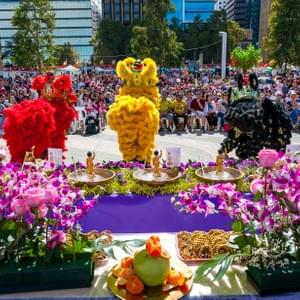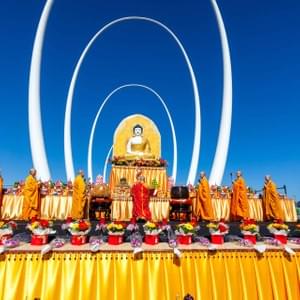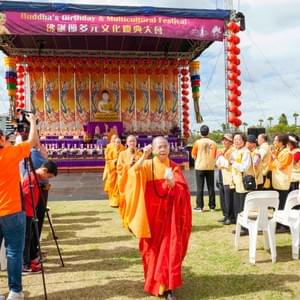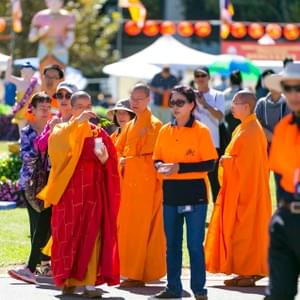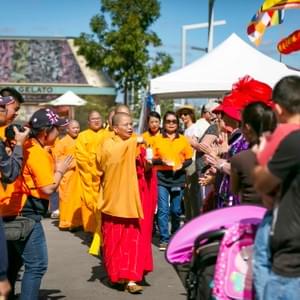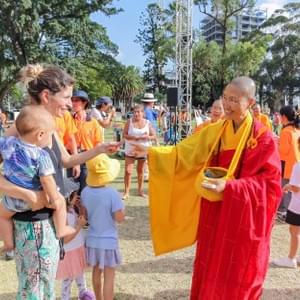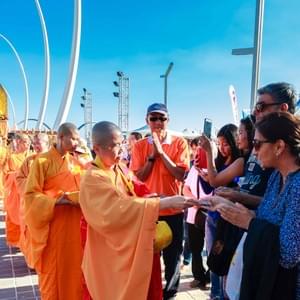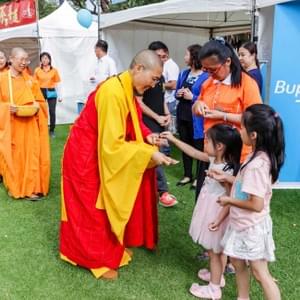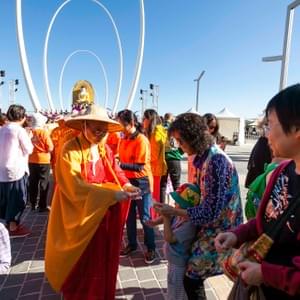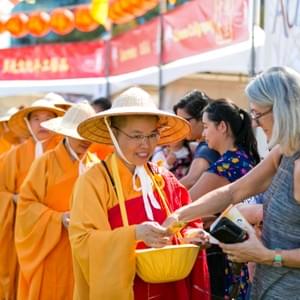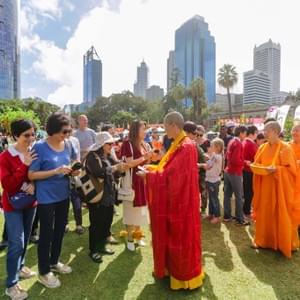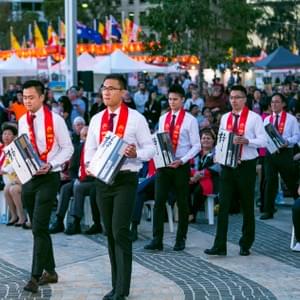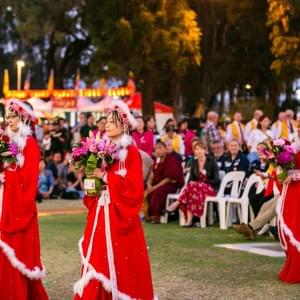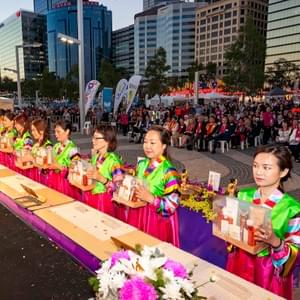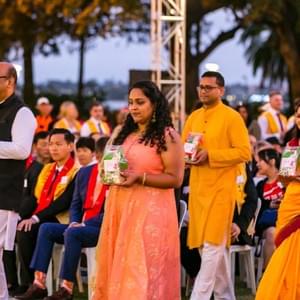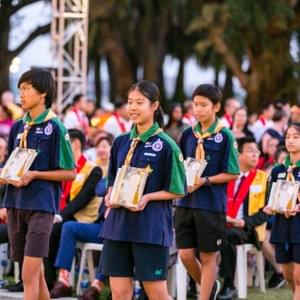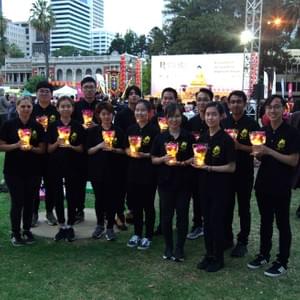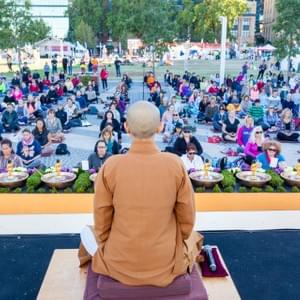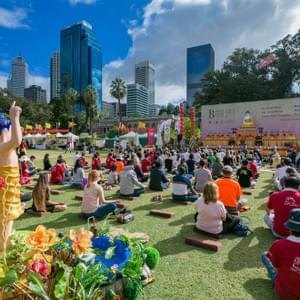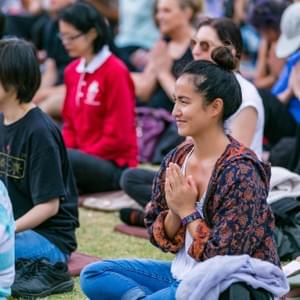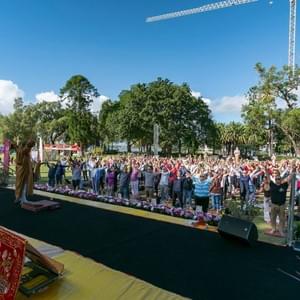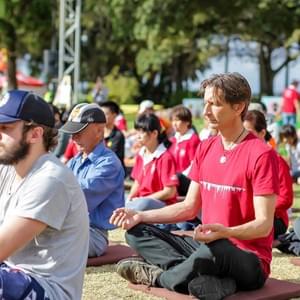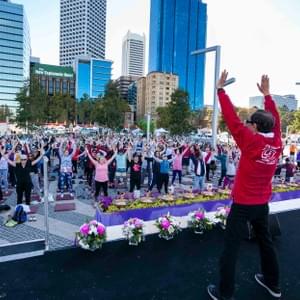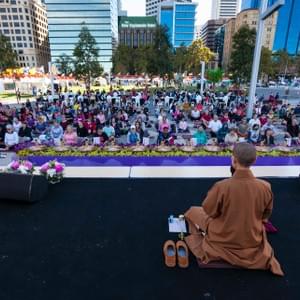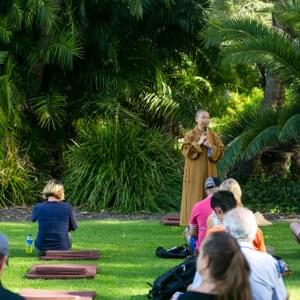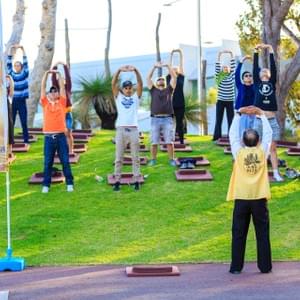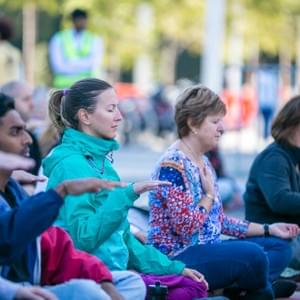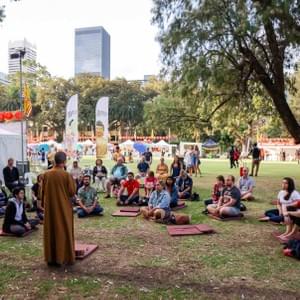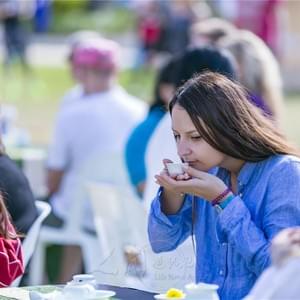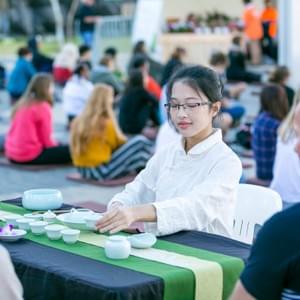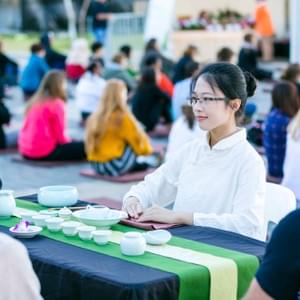
- Dharma Service
- …
- Dharma Service
- Dharma Service
- …
- Dharma Service
Origins of the Buddha’s Birthday Celebration
The Buddha’s Birthday is often known as “Bathing the Buddha Festival.” On April 8th every year, we often hear Buddhists sing, “Three thousand years ago, flowers and plants vied in blossoms under the April sky to offer compliments. The lion’s roar at Lumbini Garden was the first proclamation of universal harmony in the world.” This song describes Queen Maya, the mother of Sakyamuni Buddha gave birth to Prince Siddhartha in Lumbini Garden under an asoka tree. At that moment, the sun was shining brightly, flowers and plants vied in blossoms; nine dragons rained fragrant water from the sky to bathe the body of the prince in a golden basin. All of which were in celebration of the prince being born in the world. According to the Taizi Rui Ying Sutra, “Queen Maya of Kapilavastu gave birth to Prince Siddhartha on April 8th and the Four Heavenly Kings bathed the prince with fragrant water.” The Lalitavistara states that Prince Siddhartha, when being born in the world, nine dragons bathed the honored-one with fragrant water.
When Prince Siddhartha was born, there were various auspicious signs: shortly after birth, he was able to walk for seven steps; with every step taken, there was a lotus blossom. With one hand pointing to the heavens and the other to the earth, the prince said, “Heaven above and earth below, I alone am the World-Honored One.” After speaking these words, he became a normal baby again.
Within the Kapilavastu kingdom, from King Suddhodana, the palace ministers, to all of its people were very surprised. How come there were so many unusual phenomena? Upon the seer Asita making predictions for the young prince, it was known that if Prince Siddhartha were to inherit the throne, he would be a benevolent king who were able to conquer and unite the world. But if he were to renounce the home life to cultivate, he would definitely become the teacher of heaven and earth, attaining unsurpassed enlightenment.
The caste system was dominating Indian society at that time and it was an oppressive and unequal social system. When Prince Siddhartha was nineteen years old, he went outside the four city gates in the east, south, west, and north, witnessing the phenomena of birth, ageing, sickness, and death. In pursuit of the truth to liberate sentient beings from the suffering of birth and death, he decided to renounce the home life to cultivate.
In the first six years, he traveled to different places in search for teachers and methods of cultivation. He further practiced asceticism for six years, but in the end he felt that asceticism is not the ultimate liberation and gave up the practice. As he walked towards the field of Bodhi, he sat under a Bodhi tree to meditate. Finally, when he was thirty-one years old, in observing the night stars he attained unsurpassed enlightenment to become the Buddha. Later, on the 8th day of Lunar April (or the full moon day in May), people conduct Bathing the Buddha Ceremony in celebration.
The Significance of Bathing the Buddha
Bathing the Buddha is to cleanse the defilements within ourselves with the Buddha we bathe externally, bringing forth our intrinsic nature and realizing the pure Dharma body of the Tathagata.
Besides cherishing the memory of Buddha, we need to purify our minds; with the merits of bathing the Buddha, our parents of seven lifetimes as well as enemies and relatives in past kalpas could be alleviated from suffering, and sentient beings in the six realms of existence liberated from the sea of suffering.
In today’s society, people’s minds are no longer what they were used to be. When our bodies are dirty, we can wash ourselves with water; when clothes are soiled, we can also wash with water. However, the defilements and darkness of people’s minds can only be cleansed with the Buddha’s Dharma water. Conducting Bathing the Buddha Ceremony is for cleansing our minds through the service.
In bathing the Buddha, we are reminded to maintain a pure mind at all times. Through Bathing the Buddha Festival, we should reflect on whether our minds are pure.
The Benefits of Bathing the Buddha
In the Sutra on the Merit of Bathing the Buddha Image, it is said, “Good men and good women, after the Buddha has passed away, you should whole-heartedly be aware of the strength of the Buddha’s immeasurable merits and virtue, bathing the image of the Buddha just as if the Buddha were here. The merits attained are immeasurable and cannot be counted.” A Buddhist follower’s single thought of devotion can plant immeasurable fortune, wisdom, merits and virtues for the future. In the Sutra on Merit and Virtue of Bathing the Buddha, it is stated, “Bathing the image of Buddha is the premier in all offerings, superior than offering the seven treasures as many as sands of the Ganges River.” In addition, the Sutra states the benefits of bathing the Buddha as follows:
- You will have wealth, happiness, good health, and longevity.
- All your wishes will be fulfilled.
- Your relatives, friends, and family will all be at peace.
- You will depart from the eight difficulties and forever escape the conditions of suffering.
- You will not be born in the female form and attain enlightenment quickly.
The Fifteen Auspicious Merits Accomplished by Bathing the Buddha
- Always have humility.
- Give rise to pure faith.
- Have an upstanding mind.
- Be close to benevolent friends.
- Enter into wisdom with no outflows.
- Often see all buddhas.
- Uphold the right Dharma persistently.
- Able to practice as taught.
- Be born in the Buddha’s pure land at will.
- If born as human, will be in a noble family, respected by others, and joyful in heart.
- Born as human and able to be mindful of Buddha naturally.
- All mara troops cannot harm or trouble one.
- Able to protect the right Dharma during the age of declining Dharma.
- Be blessed and protected by buddhas of all directions.
- Able to attain the five components of the Dharma body.
Bathing the Buddha Song
Three thousand years ago, flowers and plants vied in blossoms under the April sky to offer compliments.
The lion’s roar at Lumbini Garden was the first proclamation of universal harmony in the world.
There’re causes and conditions to be born in the five kingdoms with incomparable wealth and privileges.
Went alone into the mountains to cultivate, realizing the truth under the Bodhi tree.
The saha world is vast without bounds, opening up a Dharma feast with skillful means.
Milk of great compassion given endlessly, speaking the Dharma a billion times in accordance with conditions.
Take refuge and pay homage to the World Honored-One, branches of englightenment with starry flowers blooming afresh day and night.
Have them at hand to make offerings often, boarding together the one Dharma vessel.
Gatha for Bathing the Buddha
I now sincerely bathe all the Tathagatas,
As pure wisdom adorns the ocean of merits.
May sentient beings distance themselves from defilements,
And realize the pure Dharma body of the Tathagatas.
National Buddha’s Birthday Festival – Worldwide Celebration
Buddha’s Birthday is also known as “Bathing the Buddha Festival.” The ceremony is the opportunity for us to purify our body and mind through an external ritual, fostering compassion and humility and elevating our spirituality. In commemoration of the auspicious day, BLIA chapters worldwide organized major Buddha’s Birthday celebration s on the five continents: Americas, Oceania, Europe, Asia, and Africa. A variety of events and activities were held to promote the Buddha’s Birthday: Buddha bathing mobiles, parades, prayer services for blessings, cultural exhibitions, vegetarian food fairs, etc.
With the endeavor of BLIA members worldwide, “Buddha’s Birthday” has received recognition from local residents and governments. The public’s enthusiastic response and the local governments’ active collaboration contribute to the success of the Buddha’s Birthday becoming a major festival in different regions, bringing forth a positive social energy fostering equanimity and harmony. In 2019, BLIA members worldwide on the five continents conducted a total of 1,206 sessions of “Bathing the Buddha” with 579,029 people participating in the activities; truly a manifestation of Humanistic Buddhism’s “Buddha’s light shines in the universe, dharma water flows on the five continents.”
Gallery



